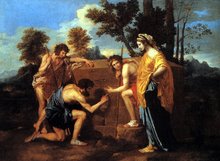
For as long as Christianity has existed, there have been heretics, and possibly even before Christianity existed, because there were already those who knew a damn site more about Jesus than Paul did, and they had formed there own church in Egypt. They consisted of, possibly some of the disciples, friends, family and associates of Jesus. You may well ask why the church formed by those individuals did not succeed where the Roman church was able. Well, in the main, the Egyptian church was a Jewish church which regarded Jesus as a prophet but a man neverthless, whereas the Roman church had deified Jesus Christ, elevating him to the position of the son of God. Did Jesus ever claim to be such, yes he did, but facing a stoning changed it to be "we are all the sons of God".
The new Roman church could not have a rival church, claiming a different "truth", and so heresy was born. Heretics were people who held the same beliefs, but may have held alternative views regarding scripture or religious doctrine. You only need to read Umberto Eco's "The Name of the Rose" to get a feel for how easy it was to be branded a heretic, where the issue of whether Jesus ever laughed takes on enormous significance. Of course it isn't enough that a heretic should burn to death for being a heretic, they must also confess their crimes under torture, and be tortured until they do confess, for confessing or not confessing, either way being accused of heresy was usually a death sentence.
Throughout the intervening centuries, the Roman church has purused relentlessly any sect or group which has threatened alternative concepts of Christianity, and especially where the enormous wealth of the Roman church was threatened. Any sect or cult proclaiming that poverty should be observed were dealt with most harshly.
With the arrival of "Witchcraft" in the Middle Ages, heresy took on a new meaning, as the Roman church had always despised women anyway, and because fear of the devil coupled with superstitious beliefs (especially among the peasantry) were very successful in drawing the masses into church. Over 1 million women are thought to have been executed for Witchcraft in the Middle Ages, most of whom were probably the victims of jealous neighbours.
Another major stop for the Roman church's blood frenzy was South America. When Cortes and his men saw the Aztec religion in action, it was not the sacrifices and violence that offended them, it was the striking similarity between the Aztec religion and Catholicism. That was the driving force for a purge of the Aztecs, it was clearly heresy at its worst. Almost certainly, the priests in the retinue of Cortes would have made it immediately plain what they thought should be done about it.








